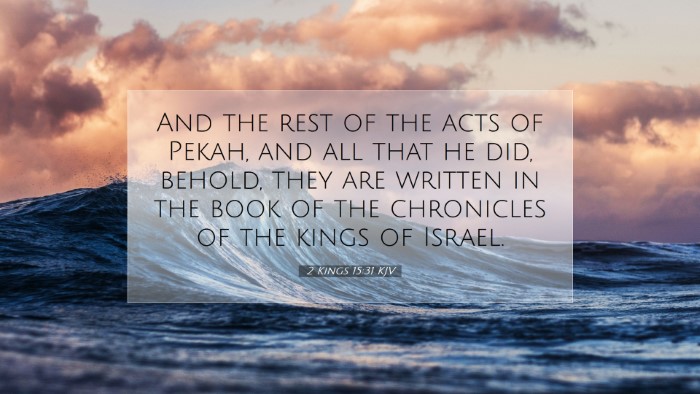Commentary on 2 Kings 15:31
Verse: "And the rest of the acts of Pekah, and all that he did, are they not written in the book of the chronicles of the kings of Israel?" (2 Kings 15:31)
Introduction
This verse serves as a concluding statement regarding the reign of Pekah, one of the kings of Israel during a tumultuous period. The chronicler’s reference to the "book of the chronicles" signifies a historical documentation tradition where the acts of kings were recorded, providing a basis for understanding the political and spiritual climate of Israel. In examining this verse, we draw from the insights of Matthew Henry, Albert Barnes, and Adam Clarke to explore its implications for biblical scholarship, pastoral ministry, and personal faith.
Contextual Background
Pekah was a military leader who assassinated King Pekahiah to seize the throne. His reign was marked by significant political instability and conflict with Judah. This period was characterized by idolatry and the continued divergence from God’s covenant, leading to eventual judgment. The mention of the chronicles indicates that there were detailed accounts available which preserve the actions of both righteous and unrighteous kings.
Historical Context
- Political Turmoil: Pekah’s reign fell during a time when Israel faced numerous external threats, including the Assyrians, which ultimately led to its downfall.
- Spiritual Decline: The kings of Israel often engaged in idolatry, contrary to the commands given to them by God. This disobedience set the stage for divine retribution.
- Chronicling History: The existence of additional records (the chronicles) points to a structured approach to preserving history, which later served to highlight God’s sovereign purposes despite human actions.
Theological Implications
This verse presents several theological themes that are significant for deeper understanding:
- God's Sovereignty: Despite the chaotic reigns and actions of kings, God's sovereignty remains a key theme throughout Scripture. The continuity of His purposes is affirmed, even amidst human failure.
- Judgment and Mercy: The chronicles serve a dual purpose; they recount the failings of leaders and the mercy of God, who continuously raises up prophets to call His people back to repentance.
- Historical Accountability: The reference to written records emphasizes the principle of accountability in leadership. In light of Scripture, leaders will ultimately answer to God for their actions.
Insights from Commentaries
Matthew Henry's Perspective
Henry notes that the phrase "the rest of the acts of Pekah" implies the incomplete understanding one might have without delving into the recorded history of Israel’s kings. He emphasizes the importance of examining these historical accounts not just for factual accuracy but for understanding God's providential hand in history.
Albert Barnes' Insights
Barnes highlights the significance of the "book of the chronicles," suggesting that the ultimate moral of the recorded history is to demonstrate the rise and fall of leaders in relation to their fidelity to God. He underlines how Pekah’s story serves as a cautionary tale of those who lead without seeking God’s will.
Adam Clarke's Analysis
Clarke’s commentary points out that the phrase reflects a broader tradition of accountability among Israel's kings. He argues that the chroniclers not only document events but also provide a theological commentary on the ramifications of royal actions, particularly in light of the covenant relationship with God.
Application for Today
For pastors, students, and theologians, 2 Kings 15:31 offers rich material for practical application:
- Leadership and Accountability: Reflection on the principles of leadership can guide modern leaders to seek God’s wisdom and remain accountable to His word.
- Historical Awareness: Engaging with the entirety of Scripture allows for a deeper understanding of God’s ongoing narrative with humanity and His ultimate plans for redemption.
- Encouragement in Ministry: The account of Pekah teaches that despite the chaos, God is still at work, which provides hope and encouragement in pastoral care and ministry performance today.
Conclusion
2 Kings 15:31 encapsulates the ongoing narrative of Israel’s history, marked by leadership failures and divine faithfulness. The insights from Matthew Henry, Albert Barnes, and Adam Clarke enrich our understanding of the text, providing theological depth and practical application for modern readers. As we reflect on these verses, may we gain a deeper appreciation for God's sovereign will and the importance of leadership that aligns with His purposes.


